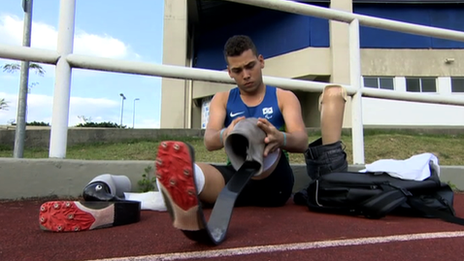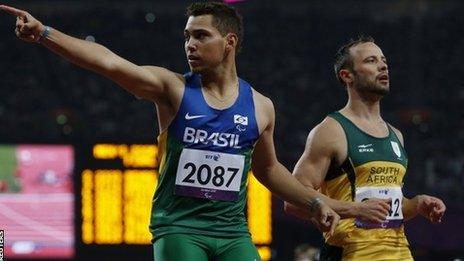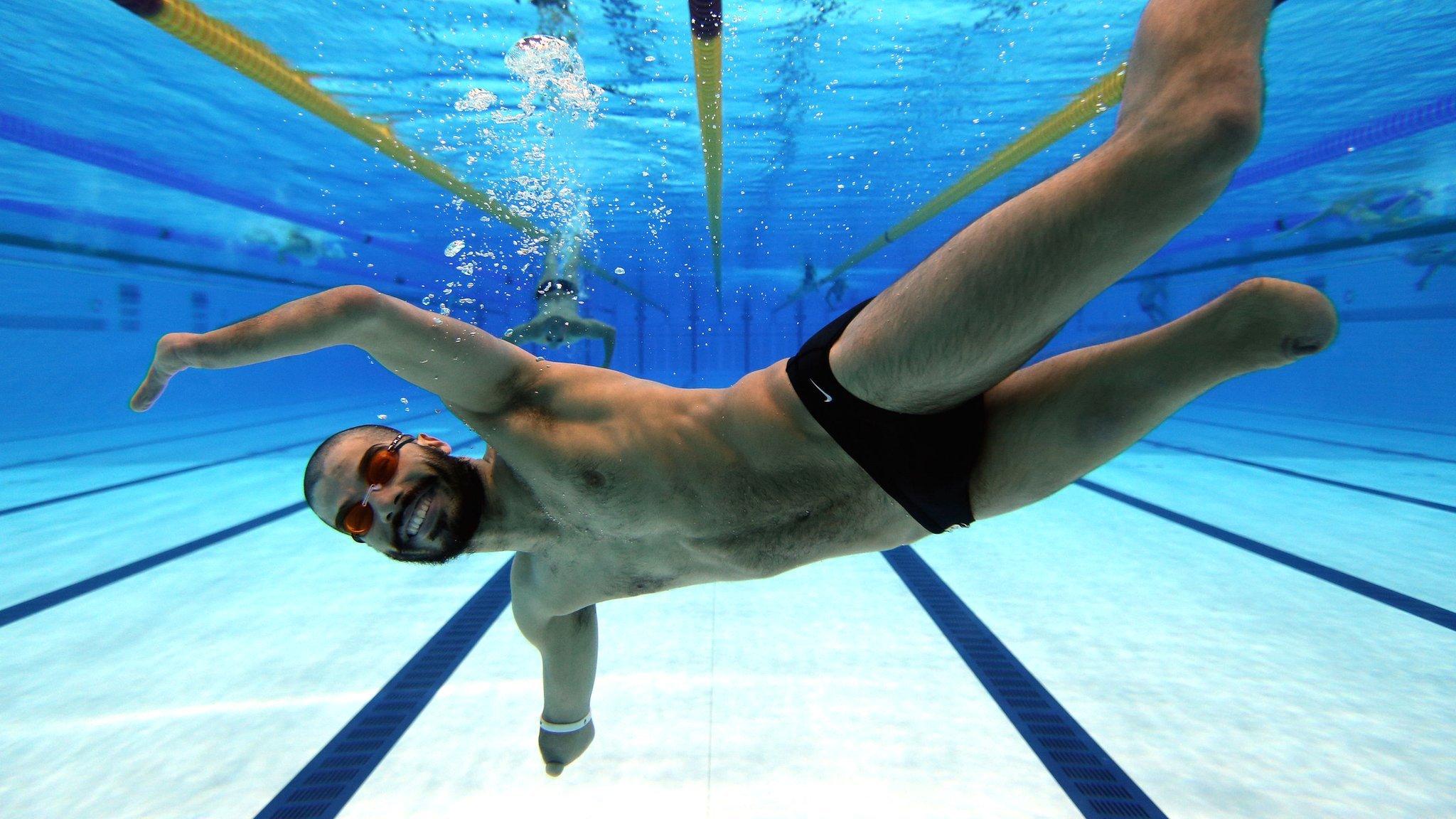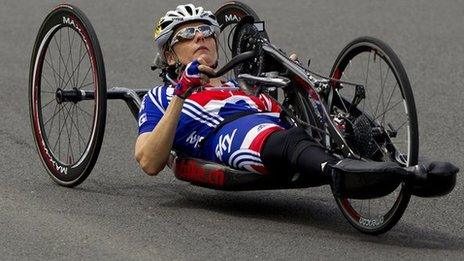2016 Paralympic Games: Rio aims to rise to the challenge
- Published
Is Rio ready for the Paralympics?
Inside the departure lounge of Rio's main airport, a young girl in a wheelchair is looking on anxiously.
"So there's no lift and the escalator is broken," says her father. "How do we get down to the gate?"
This is the airport where in just under 1,000 days thousands of Paralympic athletes and spectators will be arriving.
You do not have to go far into this country to discover that progress still needs to be made.
But that progress has already begun.
The biggest battle for Rio is not to change public perceptions or prejudices against disabled people.
Perceptions have already been changed through the actions of Brazil's Paralympic stars Alan Oliveira, who beat Oscar Pistorius in London, and swimmer Daniel Dias, who has 10 gold medals from the last two Games.
But perceptions need to be followed up by actions, something that Maria Silva, president of Rio's Olympic municipal company, accepts.
"We are working very hard to really celebrate the Games as a way to transform people's lives and to be a more inclusive city with more accessibility," she said.
"That's what we are looking for, to change the culture. We have to recognise we have to do a lot to improve the quality of life for people."
Accessibility is improving in a city where steep hills and narrow streets present a particular challenge. Better pavements, more ramps and wider entrances are all in evidence.
Sir Philip Craven, president of the International Paralympic Committee, points to the fact he can reach Rio's most famous landmark - the statue of Christ the Redeemer - in his wheelchair as proof that progress is being made.
He attended celebrations to mark 1,000 days to go until the 2016 Paralympics and saw first hand how lives were being impacted.
"Kids get it, adults have to get it," he said. "I talk about reverse education where children go back from school and educate their parents and their grandparents. That's going to happen here."
The attitudes of the people will not be a barrier, according to Paulo Prada, a Rio-based reporter.
"Brazilians aren't prejudiced or phobic towards disabled people," he said.
"But Brazil, for all of its progress economically, still has a long way to go in really basic things, whether it is infrastructure for everybody or access ramps on pavements and public facilities."
One major factor in Brazil's favour is their Paralympic team.
Seventh in the medal table at London 2012, the aim in Rio is fifth. Compare that with 22nd place for the Brazilian Olympic team.
The likes of Dias, who won twice as many golds in London as the entire Brazilian Olympic team, are in demand from fans and media.
The swimmer's smile could become one of the images of Rio 2016.
"The Paralympic Games are coming to prove we are not only a country for football," he said. "It's very important for me to be a role model to the young children that are watching me."
Oliveira, who silenced the stadium in London as he beat Pistorius in the T44 200m, agrees.
"I feel the responsibility for being one of the faces of the Games and I am getting prepared for that," he said.
These two will be crucial if Rio is to match London's achievement of selling out the Games.
Only 850,000 tickets were sold in Athens, 1.8m in Beijing and then a record 2.7m in 2012.
So can Rio match London's achievement?
"Yes, we are working a lot," said Rio 2016 president Carlos Nuzman. "We are working as much as we can do to have all the tickets sold."
Nuzman's team, settled in at the shiny new Rio 2016 headquarters, have been using wheelchairs around their offices to try and raise awareness of their key aim to make Rio an accessible city.
They also had the importance of the Paralympics reinforced by a speech from Craven, recently re-elected for a fourth term as president.
By the IPC president's side on his visit is Andrew Parsons, the man who has overseen the Brazilian Paralympic success story at recent Games.
The head of the Brazilian Paralympic Committee acknowledges the battle is always with football.
But he points out that the annual Brazilian Paralympic awards is live on Brazilian TV, a sign of the prominence of Paralympic sport.
"The biggest challenge is education," said Parsons. "I think the perception is changing because of Paralympic sport since Athens 2004. Brazilian society in general is changing.
"Rio 2016 is a catalyst, it is not the final destination. It is part of the journey, not the end of our task."
Craven is in no doubt either that change will happen.
"People said to me before London that maybe the UK does not need the Games because they have already made this transformation," he said. "I said 'you must be kidding'.
"Society will be influenced here but that happens with the Paralympics coming here. I see it as a tremendous opportunity."
- Published23 November 2012

- Published2 September 2012

- Published31 August 2016

- Published5 September 2016
